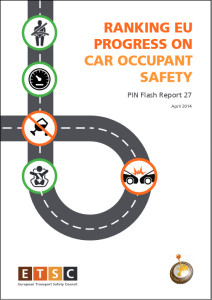 The European Transport Safety Council (ETSC) presents reports covering trends in car occupant safety twice a year, where 32 countries in and around Europe contribute with data for comparison. Two of the facts highlighted in this report is that seat-belt reminder alerts in all car seats could save 900 lives a year, and that Spain and Latvia make biggest progress in cutting car deaths.
The European Transport Safety Council (ETSC) presents reports covering trends in car occupant safety twice a year, where 32 countries in and around Europe contribute with data for comparison. Two of the facts highlighted in this report is that seat-belt reminder alerts in all car seats could save 900 lives a year, and that Spain and Latvia make biggest progress in cutting car deaths.
Transport safety campaigners are calling on the European Union to accelerate progress on reducing the number of people killed in cars every year in the EU, as new research shows 12,345 car occupants were fatally injured in 2012.
The report into trends in car occupant safety, published by the European Transport Safety Council (ETSC), found that 900 lives could be saved every year in the EU if car manufacturers were required to fit seat-belt reminder sensors to front and rear passenger seats to help prevent deaths from failure to wear belts. The European Commission is currently revising vehicle safety rules with new proposals expected next year.
Despite improvements in vehicle safety, drink driving and inappropriate speed are still contributing to many deaths on European roads. ETSC estimates that 5600 deaths, half of them in cars, could be prevented annually by eliminating drink driving and a further 1300 if the average speed on all roads was cut by just 1 km/h. ETSC is calling on the EU to mandate the use of alcohol interlocks for repeat drink driving offenders and for better enforcement of speed limits across all member states.
Despite the large number of deaths still occurring, the report finds that existing measures have been very effective – and should be widened. The report estimates that 8600 car occupants survived severe collisions in 2012 because they were wearing a seatbelt. The number saved each year by improved occupant protection, such as airbags and side-impact bars, built into cars is harder to estimate, but is clearly many thousands.
Spain and Latvia are highlighted by the researchers for having made particularly strong progress in cutting car occupant deaths. The introduction of penalty point systems was cited as being an important component in an array of measures taken to improve safety in those countries.
Continued good progress in historically safe countries
Countries with historically good performance including Switzerland, the Netherlands, the UK and Sweden have also managed to continue their good progress and are now the safest countries ranked in terms of car occupant deaths per billion vehicle-km travelled.
In Sweden, road deaths among car occupants were cut by 59% between 2001 and 2012. Swedish experts attribute these impressive results primarily to improved vehicle safety and safer infrastructure. For instance, the amount of seat belt wearers in the front seat increased from 92 % in 2005 to 98 % in 2012, and the mean speeds on national roads decreased from 82 km/h in 2004 to 78km/h in 2012. Also, the percentage of traffic made up of vehicles with seat belt reminders grew from 10 % in 2005 to about 67 % today.
“Sweden initiated a Management by Objective policy. Progress in relation to 10 indicators is monitored and presented to stakeholders annually. To reach each objective, contributions from different actors are needed. The success in reducing deaths among car occupants is showing that combined efforts from the Swedish Transport Administration, car makers, the Police and all other actors, are bearing fruits”, says Anna Vadeby, researcher at VTI and part of the ETSC panel.
The report “Ranking EU Progress on Car Occupant Safety” is based on analysis of EU data overseen by a panel of 32 road safety experts from across Europe. For further information, and to download the report and background data tables, go to www.etsc.eu/pin.
 Contact: Contact:Anna Vadeby anna.vadeby@vti.se VTI, Sweden |






Follow us: